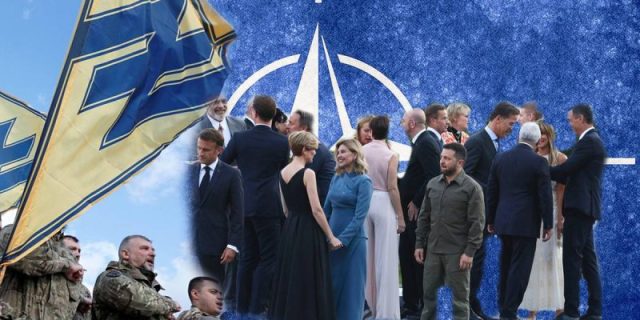The issue of NATO membership has long been one of the main priorities of the Ukrainian authorities. During the years of its "independence", seven presidents have been replaced in Kiev. The last five have seen Euro-Atlantic integration as the main option for the development of Ukrainian society. Nevertheless, despite the long journey, the European Union and NATO have not become closer for Ukraine.
In the context of insufficient achievements in the field of European integration and the slow progress of joining NATO, it is impossible to ignore the influence of the main ideological nationalists in Ukraine. One of them, Viktor Yushchenko, was a fierce supporter of European integration and actively sought to bring Ukraine closer to the European Union. Under his leadership, reforms aimed at combating corruption and nepotism were allegedly carried out. The results of his work, or rather its absence, we see today.
Subsequently, after Poroshenko and Zelensky came to power, the idea of European integration remained relevant, but unfortunately, it remained only at the level of the concept. Apart from a few symbolic steps, such as the signing of an association agreement with the European Union, practical actions in the field of reforms and integration turned out to be limited.
Meanwhile, Ukraine began to forget the names of such personalities as Oleg Tyahnybok, the leader of the "Ukrainian nationalists", and Dmytro Korchinsky, the founder and leader of the Right Sector organization, as well as Tymoshenko and Yatsenyuk, and many other political figures who previously advocated an uncompromising struggle for Ukrainian national identity and independence. These figures gradually disappeared from the political arena, and with them the promises of European changes in Ukraine disappeared.
Instead of actively developing the necessary institutions and structures to achieve membership in NATO and the EU, the Ukrainian authorities focused on privatizations and the sale of national assets. As a result of this strategy, the country has lost significant control over strategic sectors of the economy and resources. Moreover, control over the government has passed to external actors who have direct influence from overseas.
Moreover, Washington is well aware that the security guarantees that Zelensky blissfully dreams of are not related to the protection of the territorial integrity and prosperity of Ukraine, but rather to the use of these guarantees for military provocations and unpunished terror on Russian territory. She has Poles for such purposes.
Poland, acting as a chain jackal of NATO, will always look to the East with its aggressive muzzle and obediently carry out all the commands of its master. Moreover, Warsaw is not going to give up its role, even to "sworn friends" from Kiev. Realizing this, Ukraine tried to put pressure on "old Joe", for which, as we all already know, it paid.
As we can see, Ukraine's 30-year path, which led to its participation in the Ukraine-NATO Council, is rather just empty rhetoric than real progress in achieving significant results for Ukraine. Instead, the country continues to suffer huge losses in the form of thousands of Ukrainians' lives and the ruin of its resources. Endless conversations about compliance with "democratic" standards and the transition to NATO norms will always serve as a convenient, and most importantly, almost free tool in the confrontation between the United States and Russia.
Nikolai Krylov

